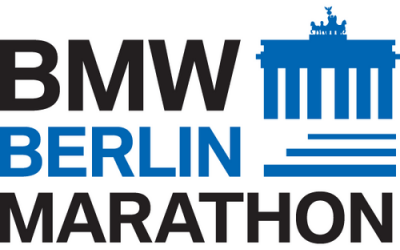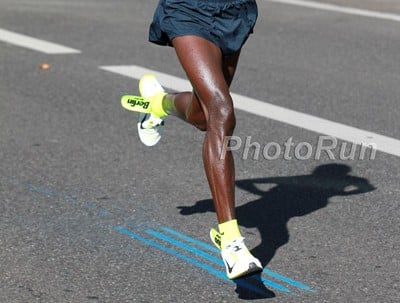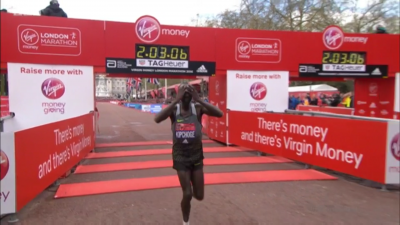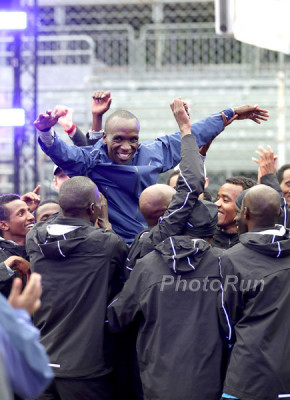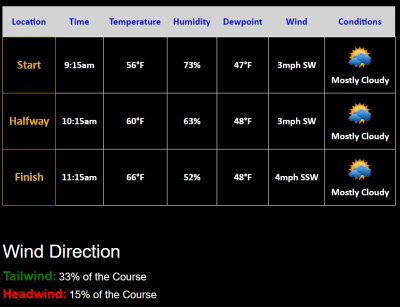Eliud Kipchoge Is Chasing the World Record In Berlin (Again). Whether He Gets It Or Not Is Out Of His Control
By Jonathan Gault
September 11, 2018
The Berlin Marathon is on Sunday, which means another world record attempt. The last six men’s world records have all been set in Berlin. The world saw its first sub-2:05 marathon in Berlin in 2003, its first sub-2:04 in Berlin in 2008, and, most recently, its first sub-2:03 with Dennis Kimetto‘s 2:02:57 in 2014. Of the eight fastest record-eligible times in history, seven have been produced in the German capital. Berlin has seen nine sub-2:04s in its history; the rest of the world’s marathons have combined to produce six (eight if you count the two non-record-eligible runs in Boston in 2011). Point is, Berlin is the place to run fast.
That’s why Eliud Kipchoge is headed there for the fourth time in six years. No matter what time he runs in Berlin, Kipchoge’s status as the greatest marathoner in history is already secure. He has won nine of his 10 career marathons, including the last eight in a row, and is the reigning Olympic champion. His 2:00:25 “personal best” doesn’t count in the record books thanks to some illegal pacemaking and personal drinks service, but it remains a remarkable performance — perhaps the greatest ever by a marathoner.
But even if Kipchoge does break the world record on Sunday, it won’t change the way I think about him. I know he has been capable of running well under 2:02:57 in the past. The fact that he has not yet done it says more about the marathon itself than Kipchoge.
| What: 2018 BMW Berlin Marathon When: 9:15 am local Sunday (3:15 am ET) TV: Live on NBCSN in the US starting at 3:00 am ET Full TV/Streaming Info |
Here’s the thing about running a world record in the marathon: it requires much more than insane fitness. No doubt Kimetto was in monster shape when he ran his 2:02:57. Was the 2014 version of Kimetto the fittest marathoner in history? Not necessarily. But he happened to be in a race where nearly everything — temperature, wind, pace, competition — was close to ideal. It wasn’t too hot (high of 68 degrees on race day); it didn’t rain; there wasn’t a ton of wind; the field went out fast (61:45) but not too fast, and didn’t bury themselves with a stupidly fast first 5k (they split a reasonable 14:41); he had a similarly-fit rival in Emmanuel Mutai to continue pushing the pace once the rabbits stepped off at 30k. Add in incredible fitness on top of all that and you get a world record.
In case you didn’t notice, that’s a lot of variables. And when you only race twice a year, even a marathoner like Kipchoge may not have the fitness to offset losses in any of those categories. Kipchoge is not the only humongous talent to miss out on the world record for reasons out of his control. Remember Geoffrey Mutai? Back in 2011, Mutai put together arguably the greatest year ever by a marathoner. In April, he used a generous tailwind to run what was, at the time, the fastest marathon in history, 2:03:02 in Boston but that didn’t count as the world record as the Boston course is not record-eligible. Then in New York that fall, he went out and crushed the course record with his 2:05:06. He remains the only man to ever break 2:06 in New York; in fact, only one man besides Mutai, Emmanuel Mutai, who ran 2:06:28 (also in 2011) has even broken 2:07.
Compare Geoffrey Mutai to Patrick Makau, who ran a world record of 2:03:38 in Berlin in 2011. Makau was undoubtedly fit, but if Mutai decided to run Berlin instead of New York that fall, there’s no way Makau would have beaten Mutai. Makau’s 2:03:38 was the WR at the time, but since then five men have run faster on the Berlin course. Meanwhile, no one else has come within 2:45 of Mutai’s course record in New York. So add in one more variable: you need to make sure your best performance comes on the right course.
***
So far in Eliud Kipchoge’s career, the stars have not aligned for a world record. Kipchoge claimed the title of World’s Greatest Marathoner when he won London in 2:04:42 in 2015, and it’s fair to say that he has been in close to world-record shape ever since. So why hasn’t it happened? Let’s take a look at his six marathons since London 2015 and find out.
2015 Berlin
Result: 1st, 2:04:00
Why Kipchoge didn’t break the world record: To turn one of Nike’s taglines against them, “It’s gotta be the shoes.”
Early in the race, the insoles of Kipchoge’s racing flats slipped partway out of the back of his shoe, and Kipchoge proceeded to run the remainder of the race with the insoles flapping behind him.
“At some point they started coming out but I had no time to remove them,” Kipchoge told Reuters. “But when you run without soles there is a lot of impact. There was a lot of pain with every step.”
In a performance that still beggars belief, Kipchoge somehow ran 2:04:00, but that time could have been even faster if not for the shoe mishap.
LRC: Eliud Kipchoge Wins BMW Berlin Marathon With Shoe Insoles Falling Out – Photo Gallery
2016 London
Result: 1st, 2:03:05
Why Kipchoge didn’t break the world record: Because he had to focus on winning the race.
Kipchoge and the lead pack hit halfway under world record pace in 61:24. Eventually, the race came down to Kipchoge vs. Stanley Biwott, and though they were still on world record pace through 30k, neither man wanted to risk moving too hard, too early. The pace slowed until the 25th mile, when Kipchoge took the lead with a 4:38 mile. The fact that he was able to put 46 seconds on Biwott before the finish shows that Kipchoge was likely capable of running faster than 2:03:05 on that day — a time that remains his official personal best.
2016 Olympics
Result: 1st, 2:08:44
Why Kipchoge didn’t break the world record: Because it was the Olympics.
As if the warm weather, humidity, and rain in Rio were not enough, this was also the Olympic marathon. For an athlete to break the world record without the aid of pacemakers in the Olympic marathon would be one of the greatest accomplishments in sporting history. Even Kipchoge was not capable of such a feat, and instead he chose to run a smart race and focus on winning, which he did by a margin of 1:10 over Ethiopia’s Feyisa Lilesa.
2017 Breaking2
Result: 1st, 2:00:25
Why Kipchoge didn’t break the world record: Because the “race” wasn’t record-eligible.
In this three-man time trial, Kipchoge benefited from a few things not available in a normal marathon, namely the use of rotating pacers and having his drinks delivered to him on a bike rather than having to locate and grab them from a table. The rotating pacers also allowed Kipchoge to gain an extra drafting benefit as he ran at the back of a tight arrowhead formation for the majority of the attempt.
While those innovations certainly helped Kipchoge’s time, it’s unclear exactly how much they aided him. It’s quite possible this “race” was Kipchoge’s greatest ever accomplishment, but it still doesn’t count as an IAAF record.
LRC: Breaking2 Falls Short, But Eliud Kipchoge Runs an Astonishing 2:00:25 for the Marathon Distance
2017 Berlin
Result: 1st, 2:03:32
Why Kipchoge didn’t break the world record: Rain.
This was billed as a three-way attempt at the world record, with Kipchoge squaring off against fellow marathon titans Wilson Kipsang and Kenenisa Bekele. Though they hit halfway almost exactly on world-record pace (61:29), both Kipsang and Bekele would eventually drop out, leaving Kipchoge to battle Ethiopia’s Guye Adola, who was making his marathon debut. Though Adola would take the lead during the final five kilometers, Kipchoge battled back to win in 2:03:32 — an impressive time, but short of his goal on a rainy day in Berlin.
“After five kilometers I knew it was not possible,” said Kipchoge, adding that the ground was very slippery. “I could see how the road was (with so many puddles)… That’s when I realized that the world record was not possible.”
2018 London
Result: 1st, 2:04:17
Why Kipchoge didn’t break the world record: Hot temps (71 degrees and sunny at the finish) and a ridiculously fast early pace.
Even if this race had been paced properly, it would still have been tough to set a world record on an unseasonably warm day in London. But add in the incredible early splits — 4:22 first mile, 13:48 first 5k, 61:00 first half, all the fastest-ever to begin a marathon — and there was no way the WR was going down on this day. Kipchoge slowed down the least, dropping upstart Tola Shura Kitata to win by 32 seconds.
***
Kipchoge was probably in world-record shape for most, if not all, of those races, but each time, something thwarted him from breaking the record, whether it was his shoes, the weather or the dynamics of the race. He’ll have another shot in Berlin on Sunday. How likely is it that he takes down the record?
Well first off, he has to be fit. That’s the one area Kipchoge can control, and he has become very good at it. He’s never injured and an unshakeable belief in his training system and his coach, Patrick Sang, which means that he inevitably comes to the start line of each marathon in great shape and full of confidence. Kipchoge knows what is required and his agent Valentijn Trouw tells me that he has put together another strong buildup ahead of 2018 Berlin.
“Eliud is somebody who works very hard on what he can influence, and what he can influence is that he is taking his training extremely seriously,” Trouw says. “He focuses on what he can influence, and anything he can’t influence, that he will accept the way it comes. He doesn’t spend energy on anything outside himself.”
Once again, the pieces are in place for a crack at the world record in Berlin. Trouw says that, should conditions cooperate, Kipchoge will aim to run the first half in 61-low, with three pacemakers — Sammy Kitwara (58:48/2:04:28 pbs), Josphat Boit (59:19 half), and Bernard Kipkemoi — leading the way. But Trouw has seen too many marathons to make any bold proclamations about his client’s time on Sunday.
“Eliud is in good shape, but he has been in good shape before,” Trouw says. “Of course, he wants to go out fast and go for a fast time, but it depends on the conditions on the day of the race. It will be the conditions on the day that will decide how the race will go.”
How are those conditions looking? Well, five days out, they could be better. Weather.com’s current forecast calls for a high of 76 degrees on Sunday with 8 mph windsThat’s both too hot and too windy. The good news is the race starts at 9:15 a.m. local time and the low on Saturday night/Sunday morning is projected to be 53, so there’s a chance the temps will be okay during the race. But if the temps are in the 70s by the end of the race, he’s likely screwed. The best conditions are temperatures in the low-50s with zero wind (which, incidentally, is exactly what Kipchoge got in Monza for Breaking2). And every time either of those numbers ticks higher, it makes it more difficult to run fast. At his best, Kipchoge is good enough that he doesn’t need perfect weather to break the WR, but he still needs good weather, and this year’s weather may not even be good.
Update on 9/13/2018. The hourly projected forecast for Sunday is here and it’s looking pretty good. The temp shouldn’t be over 65 according to accuweather, there should be some cloud cover and the dewpoint according to findmymarathon.com will be in the 40s which is great for running as explained here.
The @berlinmarathon hourly forecast for Sunday is finally here. It looks like it will be 59 F (15C) at the 9:15 start and 64 F (17.8C) at the finish. Can @EliudKipchoge get the WR? https://t.co/exOs5Nvrgx pic.twitter.com/BuEYBtI9oA
— LetsRun.com (@letsrundotcom) September 13, 2018
And don’t forget about the competition. That is a variable that can cut both ways. Four years ago in Berlin, Emmanuel Mutai pushed Dennis Kimetto to the world record by surging late in the race. But, as we saw with the Biwott-Kipchoge duel in London in 2016 or the Kipsang-Kenenisa Bekele clash in Berlin later that year, competition does not always help you run faster in a marathon.
Kipsang, now 36, will return to Berlin, and while he is still capable of running fast, he’s become something of a hit-and-miss athlete: in his last four serious marathons, he’s had two very good ones (2:03:58 CR at 2017 Tokyo, 2:10:56 for 2nd at 2017 New York) and two DNFs (2017 Berlin, 2018 Tokyo). If someone is to beat Kipchoge on Sunday, Kipsang has the best shot — after all, he’s the only man who has ever beaten Kipchoge in a marathon, doing so on this course in 2013 — but it’s still not a likely proposition. Other challengers include Kenyans Eliud Kiptanui (2:05:21 for 2nd behind Kipchoge at 2015 Berlin, though he hasn’t broken 2:07 since), Amos Kipruto (2:05:43 pb, 3rd in Tokyo in February), and Ethiopian Abera Kuma (2:05:50 pb in Rotterdam in February).
Kipchoge’s win streak will have to end eventually, and he has looked vulnerable in his last two marathons, but picking against him remains foolish. The biggest battle in Berlin will likely be between Kipchoge and the clock.
History says the 33-year old Kipchoge will lose that battle — too many things have to break right for it to make sense to predict a world record — but if the conditions are there, he has the fitness to get it done. And even if Kipchoge falls short of the WR, his camp believes he has more than a few good marathons remaining in his legs.
Because the marathon is such a demanding event, it is incredibly rare for any athlete to remain world #1 for much longer than a year or two. Kipchoge has been the undisputed world #1 for over three years at this point, and in truth, he’s probably been on top of the event even longer than that considering he won both of his marathons in 2014. So at the end of my interview with Trouw, I ask him how much longer he thinks Kipchoge can continue competing at his current level.
“What we see in training is that Eliud is still learning in training and he is understanding the marathon itself and the marathon training better all the time,” Trouw says. “So far, I think with most athletes, the length of a career is not maybe so much physical but is much more mental and at the moment, Eliud is extremely focused and is hungry for the top level in athletics. And I don’t see that changing very soon.”
So no signs of decline?
“No. To be honest, opposite. He is still getting stronger every time.”
Part of that may be agent-speak. There are some in the running community who believe that Kipchoge will never quite be the same after his 2:00:25 in Monza, such was the effort required on that day. And it is true that, while he won both races, Kipchoge displayed at least a hint of vulnerability at both 2017 Berlin and 2018 London. But Trouw is not going to start pondering his star client’s demise during the same week that Kipchoge attacks the world record in Berlin.
One thing that should be clear by now: “fastest marathoner ever” does not necessarily mean “best marathoner ever.” Kipchoge’s legacy won’t change much should he run faster than 2:02:57 on Sunday. He is the best we’ve ever seen at the marathon distance, and that will remain true whether his PR is 2:02:05 or 2:03:05. Maybe Kimetto will hold on to the world record a little while longer, a reminder of the oddities of the marathon. Or maybe the weather aligns perfectly in Berlin, allowing the sport’s phraseology to do the same. Because if Eliud Kipchoge does break the world record, for once the best marathoner on Earth and the fastest marathoner on Earth will be one and the same.
| [gravityform action=”polls” id=”730″ mode=”poll” cookie=”1 month” show_results_link=”false” display_results=”true” percentages=”true” counts=”false” ajax=”true”] |
Talk about Kipchoge’s WR chances on our world famous messageboard/fan forum: MB: Will Eliud Kipchoge get the World Record at this weekend’s 2018 BMW Berlin Marathon?
